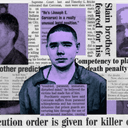
Sister Helen Prejean, the acclaimed author of Dead Man Walking, has written a new spiritual memoir, River of Fire: My Spiritual Journey. The book, released August 13, 2019 by Random House publishers, tells the story of her spiritual development from joining the Congregation of St. Joseph at age 18 to becoming a leading voice in the movement to abolish the death penalty.
The “spark at the heart of [her death-penalty activism],” Prejean told The New York Times, was when, in her forties, she first started corresponding with death-row prisoner Patrick Sonnier. That experience formed the basis of Dead Man Walking. “The big annunciation was writing a man on death row and witnessing his execution. When I walked out of that execution chamber, all this was new to me. I didn’t know anything about the criminal justice system. I love to quote what Tim Robbins said: ‘The nun was in over her head.’ Back then I didn’t know anything.”
Prejean has provided spiritual comfort to six men whom she accompanied to their executions. She described that experience to Terry Gross on NPR’s Fresh Air, saying, “Of course I’m on the outside of them, but in a way I’m on the inside of them too, because I’ve gotten to know them. … [They] cannot help but anticipate and imagine their death, which is coming. It’s predetermined, and they all have the same nightmare: ‘The guards come in for me. It’s my time, and I’m kicking, struggling, “No, no!” and they’re trying to drag me out of my cell, and then I wake up and it’s a dream.’ … They shared that with me and their inner anguish.” She said that, during the executions, she tries to convey “pure presence” to the prisoners. “In my faithfulness to them and in visiting them, they know my love and care for them, and that I believe in their dignity.”
River of Fire discusses how her life was affected by the Church reforms of Vatican II in 1962, which allowed her greater freedom to choose her own ministry, and how she later came to embrace a mission of social justice. In interviews about the book, she describes breaking out of “two cocoons.” “One was the spiritual one that by praying you helped the world be a better place. And the other was white privilege because I was taken care of in every way. Nuns were held in great regard. We could ride the buses free. If we went to a restaurant, someone would pay the bill. I didn’t know any poor people. I didn’t know that right down the street from the convent where I was living, in the New Orleans suburbs by the lake, were 10 major housing projects. You grow up in these envelopes. My good mama and daddy would say, ‘Now honey, it’s better for the races not to mix.’ I didn’t know booscat!”
Sister Helen Prejean, River of Fire: My Spiritual Journey, Penguin Random House, August 13, 2019; Terry Gross, Sister Helen Prejean On Witnessing Executions: ‘I Couldn’t Let Them Die Alone’, NPR, August 12, 2019; Susan Larson, Unstoppable: At 80, Sister Helen Prejean has an ongoing mission and a new book, Nola.com, August 6, 2019; Penelope Green, Sister Helen Prejean Explains It All for You, The New York Times, August 10, 2019.


